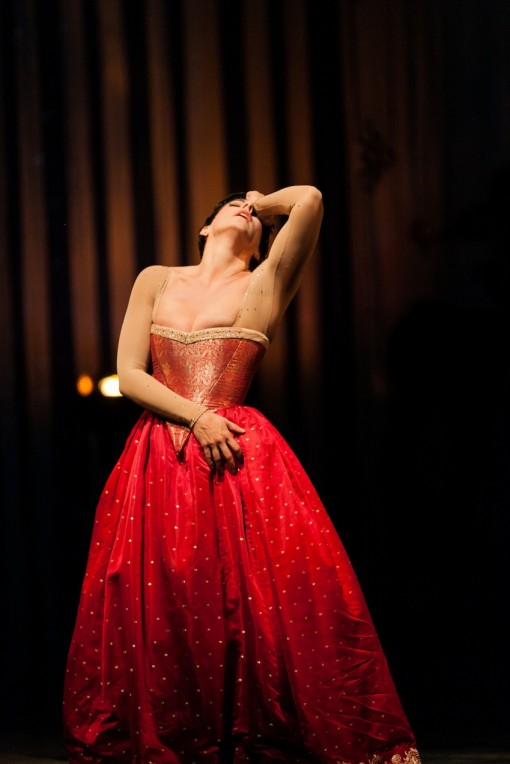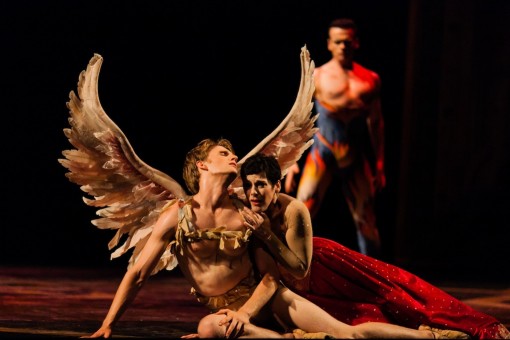Glimmerglass scores with a colorful, sumptuous “Armide”

Peggy Kriha Dye in the title role of "Armide" at the Glimmerglass Festival. Photo: Karli Cadel/The Glimmerglass Festival.
Baroque opera, thankfully, is flourishing at the Glimmerglass Festival. The willingness to stage operas from the century and a half before Mozart — Monteverdi, Handel, Purcell, Gluck, and Cavalli have all been featured since 1994 — is part of what brought the company to greater prominence.
The name of Jean-Baptiste Lully (1632-1687) was added to that list this year, with a sumptuously beautiful staging of Armide, heard Sunday afternoon, that was the high point of an otherwise mixed season. The production was imported from Toronto’s Opera Atelier and its fine Baroque ballet company, a smart decision for the realization of the ballet music, so crucial to the Lullian style.
Philippe Quinault drew the libretto from one strand of Torquato Tasso’s immense fantasy epic La Gerusalemme liberata. During the First Crusade, the troops of Godefroy de Bouillon are laying siege to the city of Jerusalem, which is protected by the Muslim sorceress Armide and her kinsman Hidraot. Armide traps Godefroy’s strongest soldier, the invincible Renaud, in a spell that makes him fall in love with her and forget his military duty. Aided by magic, two of his fellow knights manage to break the spell and return Renaud to the Christian camp, leaving a desperate Armide, who has fallen in love with the handsome knight, to destroy her palace in rage.
Armide was one of the most successful and popular French operas of the 17th century, periodically revived in Paris through the 18th century. This staging by Marshall Pynkoski, premiered in 2005, gives this intensely appealing work a form that reveals to modern audiences what Lully accomplished at his best. The sets by Gerard Gauci, with designs based on the Sufic script and Arabesque decoration in Persian illuminated manuscripts, provide a gorgeous backdrop for Atelier Ballet’s handsome dancers, in diverting and well-executed choreography by Jeannette Lajeunesse Zingg. Dora Rust D’Eye’s colorful costumes in a rainbow of bright hues for the Saracen court round out a feast for the eyes. The only misstep in the staging was the icons of Jesus and the Virgin Mary on Hidraot’s throne, images that would have been destroyed under Muslim rule, as they were in Hagia Sophia, for example.
None of this would be of much use without the excellent musical performance that animates it. Soprano Peggy Kriha Dye was a compelling Armide, with a tightly coiled vibrato that added punch to an already spicy voice and a vital sense of drama in Enfin il est en ma puissance. Colin Ainsworth’s flexible high tenor was a perfect match for the role of Renaud, full-bodied and true of intonation but also capable of airy lightness at the top, with good looks to boot.
Both João Fernandes (Hidraot) and Curtis Sullivan (La Haine, the spirit of hatred summoned up by Armide) seemed cast more for physical reasons than vocal ones. Glimmerglass Young Artists did some of their best work of the season, including sopranos Mireille Asselin and Meghan Lindsey as confidantes and spirits of Armide, and tenor Aaron Ferguson as a bumbling Chevalier Danois. With Olivier Laquerre as Ubalde, Ferguson’s hapless rescue of Renaud was an unexpected comic highlight.
Conductor David Fallis led a fine rendition of the score, with modern instruments combined with a few historical touches like two recorders, two theorbos, and harpsichord. The performance omitted Lully’s prelude, a sycophantic tribute to Louis XIV that was often left out in the 18th century, and cut the fourth scene in Act IV, in which Ubalde faces his own amorous temptation. Fallis and the musicians did well in the multiple dime-turning of Lully’s style, which shifts from darting recitative to curling arioso with startling freedom, encountering misalignment issues only with the chorus positioned in a balcony above the audience. For its musical and visual delights, this production is the best reason to make a trip to Glimmerglass this summer.
This production continues through August 23 at the Glimmerglass Festival. The festival’s 2013 season will again feature only two operas, Wagner’s Flying Dutchman and Verdi’s Un Giorno di Regno (in English), plus Nathan Gunn in Camelot and a double-bill of David Lang’s Little Match Girl Passion and Pergolesi’s Stabat mater.

Jack Rennie as Love with Peggy Kriha Dye as Armide and Curtis Sullivan as Hatred in the Glimmerglass Festival production of Lully's "Armide." Photo: Karli Cadel/The Glimmerglass Festival.
Posted Jul 29, 2012 at 11:55 pm by Benson
Sorry no thanks.
I’m happy to remain outside the realm of those superior people who think opera ended with Gluck. Those creatures who think that early and baroque opera is the bees knees. I just find most baroque opera to be overly repetitive, dull, clinical, some sort of academic exercise.
Posted Jul 30, 2012 at 6:26 pm by KennethConway
Don’t let the door hit you on the way out.
Posted Jul 30, 2012 at 7:58 pm by Ingrid
You know, despite years of considering myself a fan of opera, I’ve never heard anyone remark that they thought opera ended with Gluck. I mean, who says that? If anything, the majority of opera lovers think opera didn’t begin until Mozart.
The revival of baroque opera is still in its youth. Give us a break Benson.
Posted Jul 31, 2012 at 11:33 am by Charles
@Benson: I just find most baroque opera to be overly repetitive, dull, clinical, some sort of academic exercise.
An understandable way of thinking given some of the early attempts to revive Baroque opera. If you can stand to have your opinion challenged, give this “Armide” a shot. It is probably the best chance for you to change your mind.
Posted Jul 31, 2012 at 2:11 pm by Benson
@ Charles: It is probably the best chance for you to change your mind.
Ok will do. But I’m not holding my breath that it will be on a par with ‘Pelleas et Melisande’, ‘Falstaff’, ‘Moses and Aron’ or ‘Palestrina’